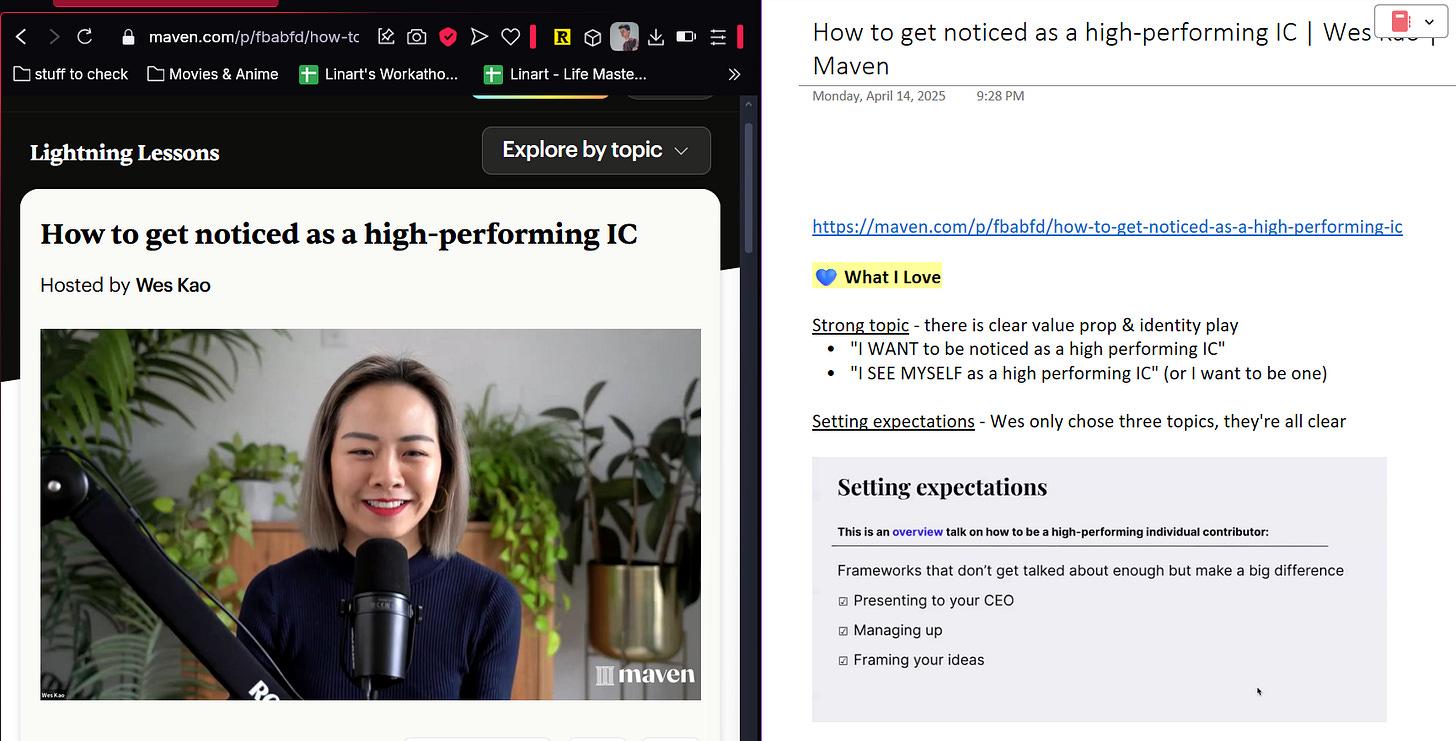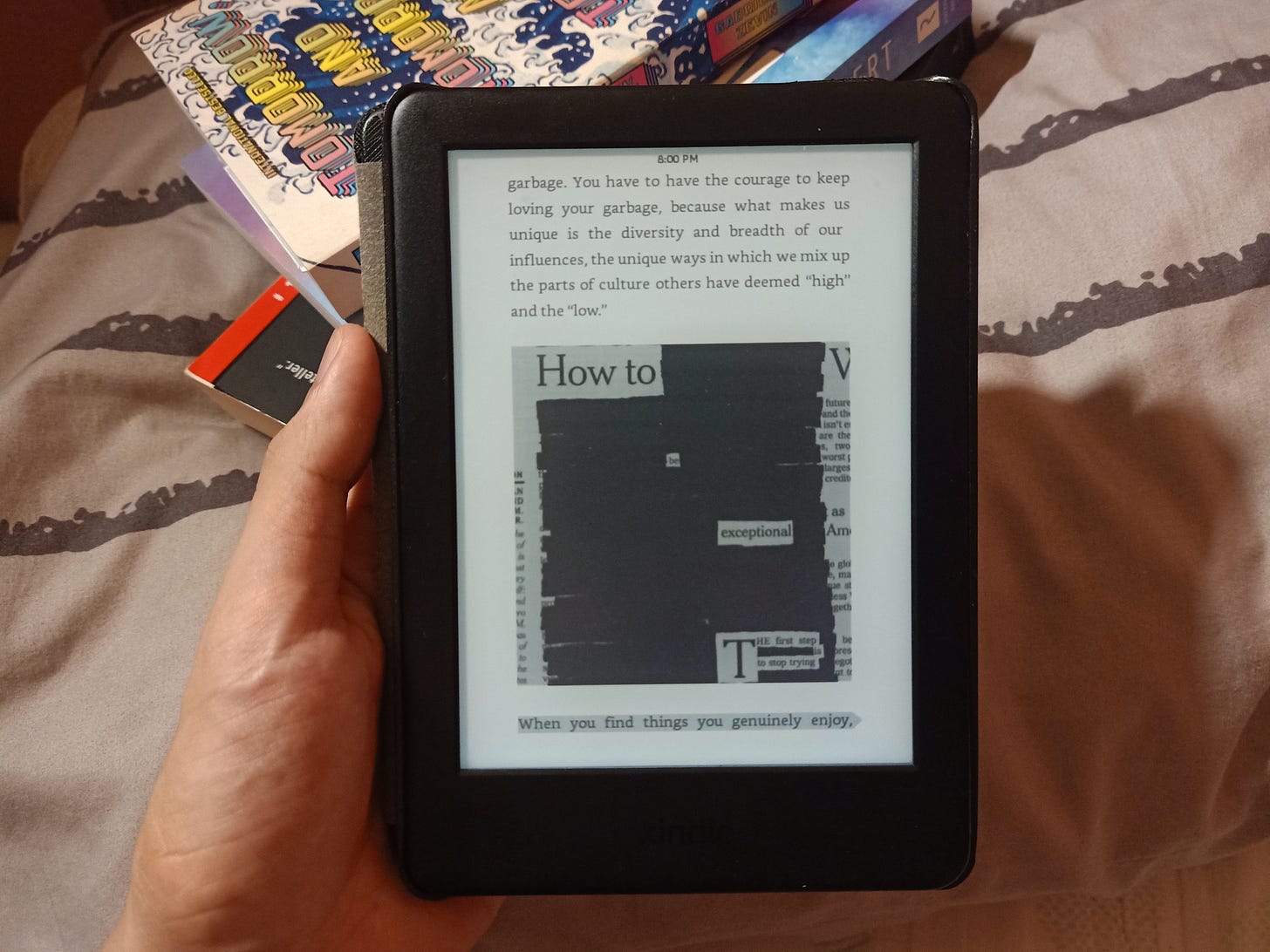2025 Apr 26: Hey, friends! I’ve taken several breaks this year to reconnect with myself. Along the way, I found comfort in the stories of others. Seeing how people lived through struggles and uncertainty made me feel less alone in my journey. After all, being in your 20s can feel disorienting, with so many questions that don’t have clear answers. I still don’t have all the answers either, but I think my story is worth sharing anyway. Like how the others guided me through their thoughts, experiences, and lessons, I want to make the effort to share what I’m learning too. I hope I’m able to do that in this piece.
🌱 Three Lessons I Learned
1/ Skip the parts you don’t enjoy. My cousin skips episodes when watching a TV series. Sometimes, she’d go right at the end just to spoil herself. “Wow, and that works for you?” I asked her with surprise. She said it’s what makes her enjoy the story more.
Finishing a book in chronological order is how I learned to read. But this week, I tried reading only the chapters I found exciting, and completely skipping the rest. While reading “Good Work” by
, for example, I thought the first few chapters on embracing the unknown were less relevant to me. So I jumped straight to Chapter 9 because the title, “Do What Feels Right”, felt intriguing. And I was right. You might even say I did what felt right. Paul talked about a stage in his life that felt closely synonymous to mine. I think it’s what inspired me to start writing again here.This approach also feels a lot more nourishing to me. By giving myself permission to skip what I don’t enjoy, I’m freeing myself to explore and learn whatever captures my interest. And as a result, reading became more enjoyable. I no longer feel pressured to start (and finish) a book knowing I can only choose to read what feels good to me. I ended up spending more time reading books and essays.
2/ How can I enjoy this 10% more? There are tasks I hate doing, but have no other choice but to complete them. Every Monday, for example, I need to manually credit loyalty points to customers as part of my day job. It’s a manual task that’s repetitive and dull. And sometimes, I’d much rather stare at a wall than work on it.
There’s an experiment from Joe Hudson that I really love: Try to enjoy this moment just 10% more. You can even try it now if you like. Just feel it in your body, and allow yourself to enjoy this very moment just a little bit more.
If you’re like me, you might be surprised to notice that you can actually let yourself feel more joy, even if nothing changes externally. I’ve been doing this more often when I’m resisting something (like a task, a thought, or an emotion). This helped me notice that I hold a lot of tension in my body, and that’s probably why I feel a lot of resistance in the first place. This practice helps me ease and relax that tension.
Another thing I learned is recognizing what part about the task I can learn to love. Sometimes, no matter how I feel about the work, it doesn’t change the fact that I still need to do it anyway. So I’m choosing to enjoy it more often. As much as I dislike the manual task of crediting loyalty points, I do like the challenge of finding ways to make it easier for myself every week. That’s the part of it that I can enjoy.
3/ Study the greats. I believe we’re now living in the age of infinite education. Anything you want to learn is now accessible online. Not just information, but incredible resources rich with knowledge and wisdom from remarkable people. Whenever I want to learn how to do something, I lean into searching for individuals who have done it well before. And then I carefully study what they did.
For example, I’m planning to relaunch my UPCAT test prep program this year, and I had this idea of running webinars to attract more students. When I launched the program last year, 70% of the sign ups came from a free session I hosted. It only made sense to me to double down on it this year, especially because it’s a marketing strategy I actually enjoy doing. The challenge for me, however, is how I can level up from last year.
I saw that Gagan Biyani and his company, Maven, are doing exactly what I envision for the webinars. They call it Lightning Lessons, and having joined some of these webinars, I personally enjoy the way they designed it. It’s free. It’s short—usually just 30 mins. And they teach lessons I wish I had learned earlier in my career. I spent one night watching a talk by
, taking notes on what I love, what I hate, and what I wished to have seen in the session. Then I watched a few more afterwards. After the third episode, a pattern started to emerge, and I started seeing what makes their Lightning Lessons great.
💡 Two Curations I Enjoyed
1/ A week in the life of Daniel Dalen (h/t ). After pausing all my goals and projects last month, I’m beginning to feel ready to step out into the world again. I’m not feeling as motivated as I was before, so I’ve been borrowing inspiration from others in the meantime.
A great source of energy for me are the early vlogs of Daniel Dalen. He’s in his 20s traveling the world and building a business he’s excited about. He’s with a great team who he can have fun with. And… he has really good music taste. Not gonna lie, this is probably what drew me in.
2/ How to learn complex topics 10x faster with NotebookLM by . Learning on your own works great, but the experience is better when you have a companion. In the age of infinite education, you want to be able to cut through the noise and focus on what really matters. NotebookLM has helped me make that happen.
My favorite way to use it is compiling podcasts, books, and essays from someone I want to learn from, and I just ask it a bunch of questions to help me dive deeper. For example, I’ve been learning how to be more emotionally intelligent through Joe Hudson. In one podcast, Joe mentioned it’s important to enjoy what you do, in contrast to doing what you enjoy, and I was intrigued by the idea. I wanted to learn more. So I compiled several other podcast episodes, hoping Joe would talk more about the idea there. Then, I asked NotebookLM to search through all the 10+ episodes and focus only on the concept of “enjoying what you do.”
It shared snippets of what Joe actually said from different podcasts, and did it in only a few seconds, when normally it would take me hours to complete such a task. I thought that was really cool. And if that wasn’t cool enough, it could even create its own podcast episode focusing only on what you’d like to learn about. You even get to join in on the podcast!
I discovered NotebookLM thanks to
. His essay describes other use cases and exactly how he applies them. I recommend checking it out if you’re interested.🌷 One Thing I’m Thinking About
What if I stopped doing what I don’t enjoy? This year has been transformational for me. After working harder than I ever did last January, I burnt out and realized my ambition is no longer serving me. The discipline. The drive. They all served me in the past, especially as a student, but they turned into unhealthy habits that no longer fit the kind of life I want to live.
Part of this journey is discovering new ways of living I’ve never seen before. One of which is seeing that it’s possible to do good work without pain and struggle. The realization came to me while reading “Good Work.” Talking about his writing process, Paul told a story about writing for 30 minutes and feeling stuck along the way. I thought he would push through the struggle. After all, he cares about the craft and he’s good at it, too. But instead, he simply decided to stop writing. “I’m done for the day!” he declared as he got up from his seat.
This is different from my belief about meaningful work. When I’m focusing on a personal project, I’d often force myself to push through the struggle, especially if I see the work as something that’s important to me. That’s why I kept writing for 33 weeks last year, even when the writing felt painful. And that’s also why after the 33rd essay, I couldn’t bring myself to write again until 6 months later.
I missed the whole point of good work. My good work should serve me, not the other way around. So I started experimenting with this new mindset of not forcing myself to do things I don’t want to do, and to make more space for what I feel naturally drawn towards instead.
As much as the Lightning Lesson idea felt exciting, I decided to take my time with it. Taking just small, incremental steps to make progress. And I’m not even working on it everyday. This might mean missing out on some opportunities, and taking longer than I would have liked. But at this point in my life, I feel like this is the right thing to do.
Thanks for reading!
Some final notes from me:
💌 Send me a reply if you’d like to connect or ask a question. I do my best to always respond, and your message would make my day!
📊 Are you familiar with consulting work? I’m currently interviewing for a consulting associate role (😬) and the work sounds interesting, but I’d like to see the full picture. What’s fun about it? What sucks? What’s a typical day or week like?
💙 I want my writing to help me find others on similar paths. Did any of my stories resonate? Is there anything you’d like to share? I’d love to chat and learn from each other.





You are so onto something here. Keep going 💙
Love this essay Linart.
One of my hacks whenever I'm doing something with high resistance is also to imagine: "What if this was easy?"
It puts my brain into ease and prevent me from pressuring myself with expectations or goals.
So I can enjoy whatever I'm doing.